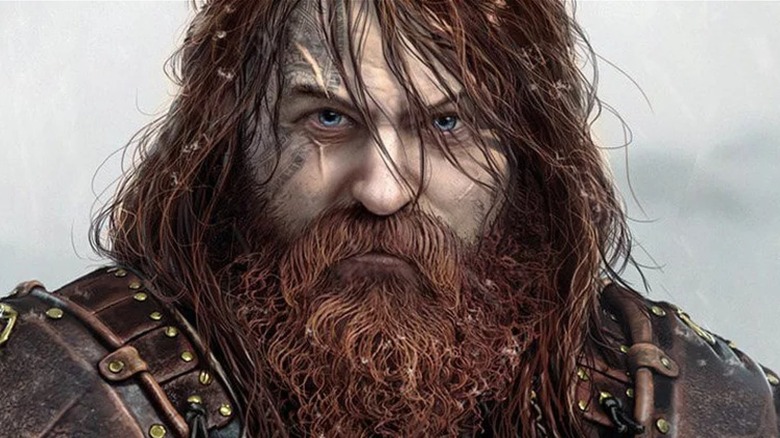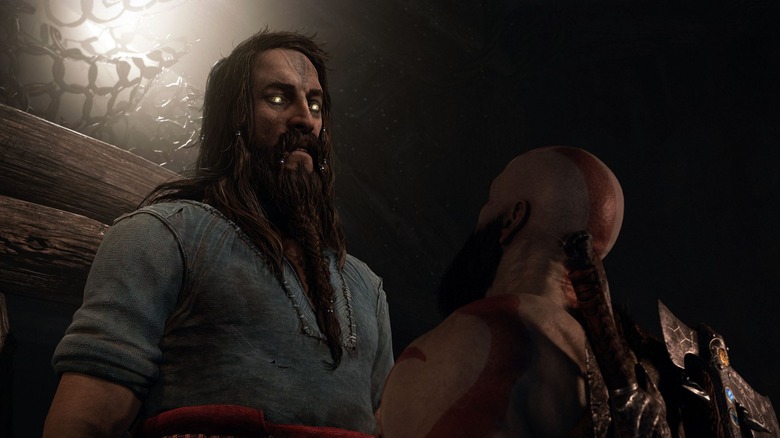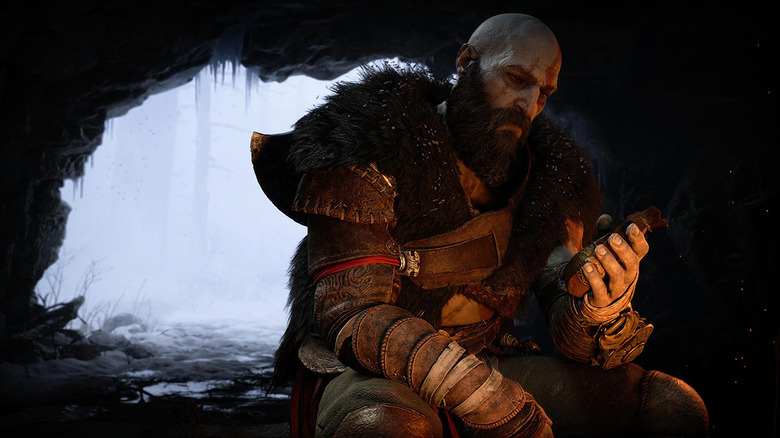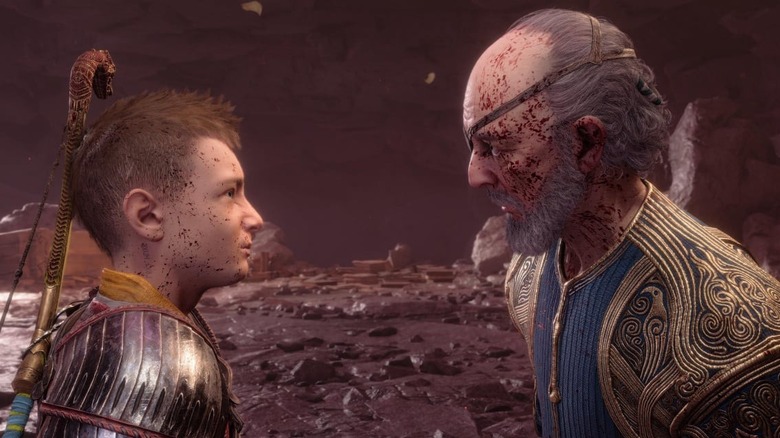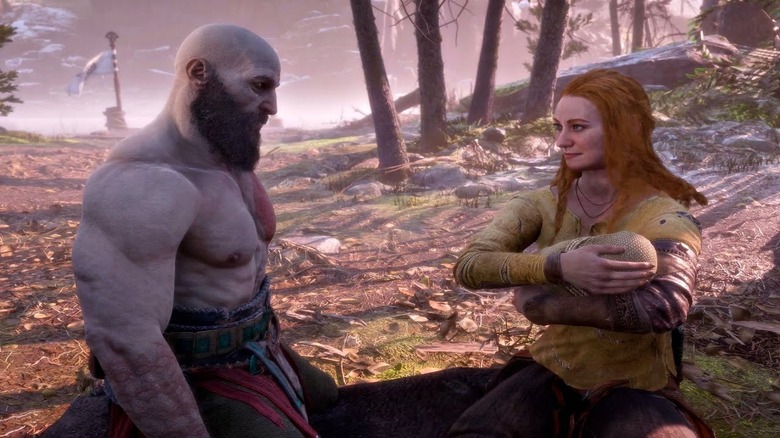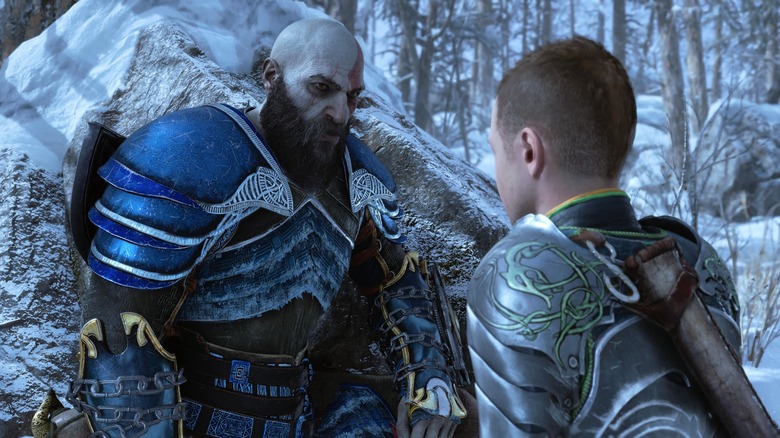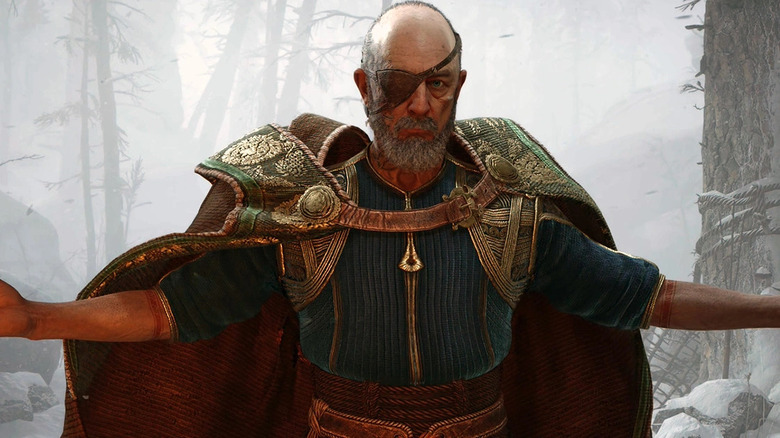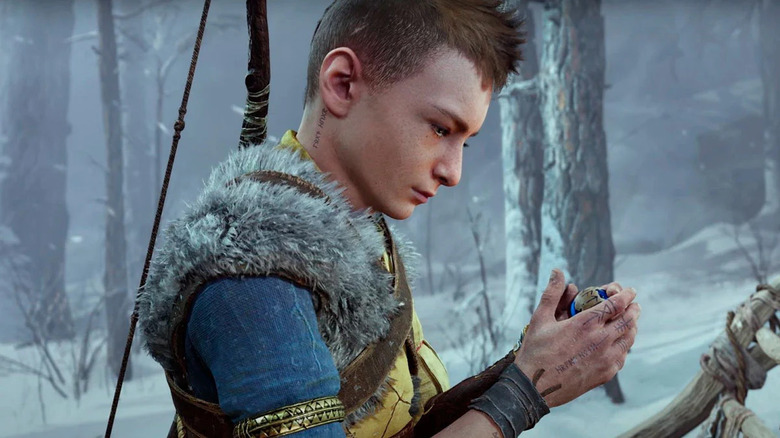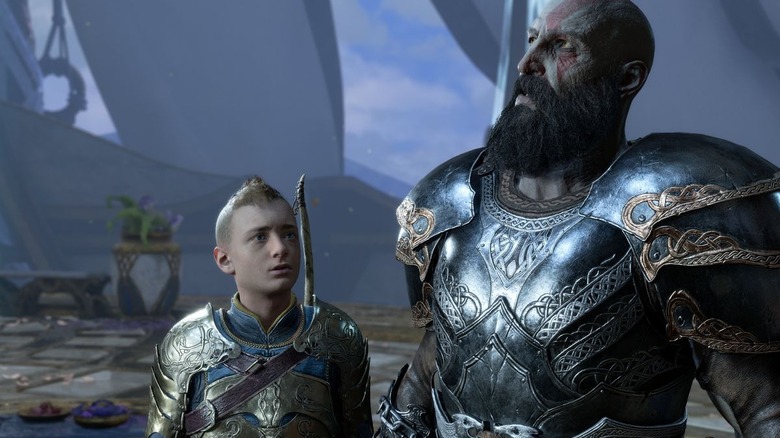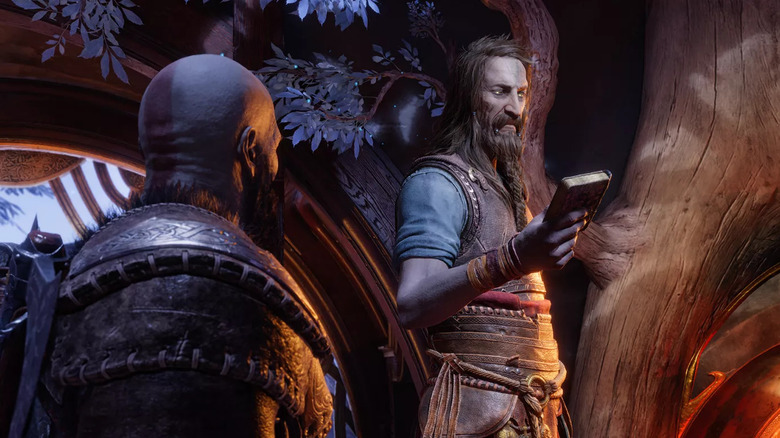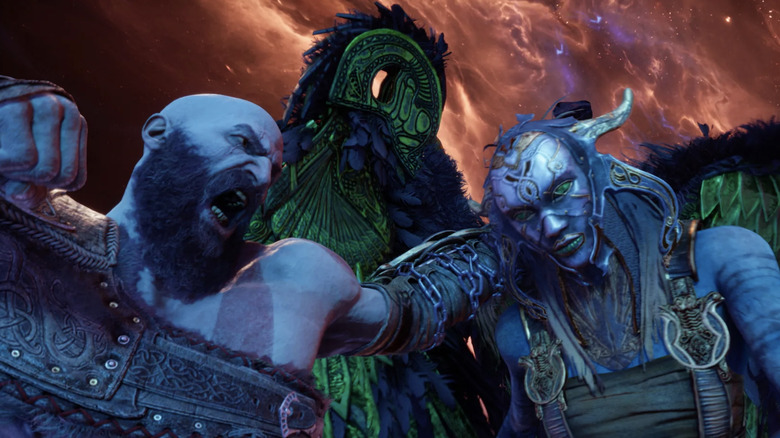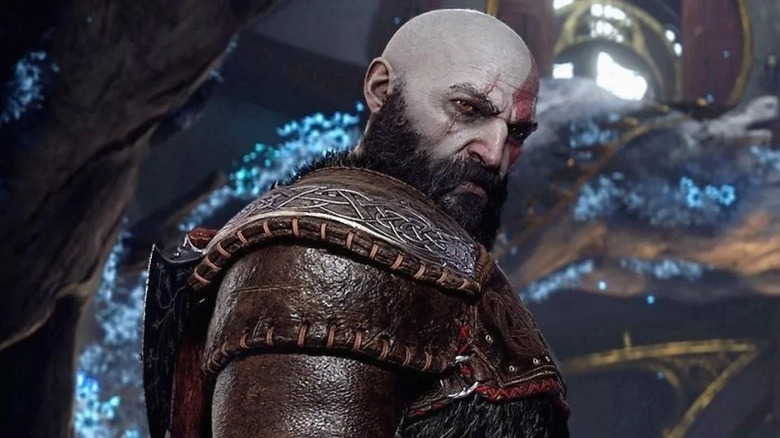Ending Of God Of War Ragnarok Explained
The "God of War" franchise has returned with "God of War Ragnarok," the highly-anticipated sequel to Sony Santa Monica's massive 2018 hit. The sequel brings Kratos' Norse saga to a close in an incredibly epic fashion, reuniting fans with Kratos (voiced by Christopher Judge) and his son Atreus (Sunny Suljic) as they embark on a new journey to understand the truth behind their discovery of Atreus' heritage. Along the way, they must contend with the looming fear of Ragnarok as both Thor (voiced by Ryan Hurst) and Odin (voiced by Richard Schiff) tighten their grip. This new journey sees Kratos and Atreus rejoin with old friends and make new enemies across the nine realms, hitting new emotional peaks and mastering new abilities.
There's a reason that "God of War Ragnarok" is already being hailed as a game of the year contender, and it's largely because it features an amazing story that ties up the previous game's loose ends, leading to the incredible realm-clashing conflict of Ragnarok that changes the story of "God of War" for good. Now, there was a lot happening leading up to, during, and following the game's climatic finale. Some details might've been missed in the midst of all the huge battles. So, we're here to do a deep dive into that epic ending.
Sudden deception
After saving Tyr, the Nordic god of war, early in the game, he becomes kind of a wild card you can't quite put your finger on. Although Atreus believes that he is the key to leading Ragnarok and stopping Odin, his pacifist turn and constant disapproval of the group's plans makes you doubtful of his ability to play a big role. Then, he suddenly decides to lead the team to Asgard once Atreus returns with Loki's completed mask (more on that in a bit). Brok is easily the most suspicious of Tyr at this moment and confronts him about it. This decision ultimately proves to be fatal, since Tyr is actually Odin in disguise.
In one of the story's most shocking twists, it turns out that Odin has infiltrated the group the whole time posing as Tyr and has been trying to lead the group to failure the whole time. This twist definitely explains why Tyr has seemed like such an obstacle on the team, always undermining Kratos' decisions and criticizing those around him without offering much resolution, and why Odin never really felt the need to press Atreus on information since he already had it. It's a huge gut-punch that this betrayal comes with the death of Brok and really sets the finale in motion as everyone needs time to collect themselves after such a swift and unexpected tragedy.
Some things never change
Kratos' journey throughout the Nordic chapter of his life has seen him try to turn a new leaf and leave his rage-filled side behind, or at least hidden. No longer does Kratos want to be revered as a vengeful god-killer, which is a big reason why he doesn't want to be seen as "The Champion" of Ragnarok, since it would mean that he has to tap into parts of himself he'd rather forget. However, old habits die hard. Kratos is forced to become the god killer once more — just not in the same way.
Fate is a key theme of this story, with questions of choice and destiny haunting Kratos throughout. While he doesn't want to always have to use violence and death to solve his problems, fate seems other plans for him, as he sees that he's apparently destined to kill Heimdall and take on Odin. However, while he might be locked into combat by fate, Kratos learns he can choose to change the outcome. He might become forced to kill Heimdall when the Norse god refuses to back down, but when it comes to Thor and Odin, Kratos is able to show some restraint and choose a different path for himself. Kratos might not always have a say in the matter, but the events of the game shows that he is capable of taking the high road.
Loki's mask
After Atreus makes the journey to Asgard to see Odin, he's tasked with piecing together a strange mask for Odin, which will allow him to peer into some kind of mystical tear that'll supposedly offer answers to the future of Asgard. With the help of Thor and his daughter Thrud, Atreus travels to different realms to find the other pieces, eventually piecing the whole mask together right before Ragnarok begins. So, why is Odin obsessed with this mask?
Well, Odin is incredibly scared of Ragnarok, since it's prophesied that not only Asgard will fall as result of it, but Odin will as well. Therefore, Odin becomes obsessed with completing this mask in the hopes that he can learn if Ragnarok will really be his end. Odin literally sacrifices everything for this, including killing his own son Thor and putting innocent Midgardians in the line of fire. Ultimately, never gets to see the answers he craves as Atreus defies him and destroys the mask.
Faye's flashbacks
Throughout "God of War: Ragnarok," Kratos is transported into the past through some dream sequences that see him interact with Faye, his late wife and Atreus' mother. In the final memory before Ragnarok begins, Faye offers Kratos some heartfelt advice about opening his heat and letting love drive him, rather than cold vengeance. She tells him that death shouldn't be a driving force for action, reminding Kratos of the power of choice and the effect his decisions have on Atreus. It's an emotional and moving sequence that'll easily bring a tear to any player's eyes, but the conversation also plays a pivotal role in Kratos' mentorship during the final act.
When Atreus and Kratos see the Midgardians being endangered by Odin's machinations, he makes the choice to save them instead of focusing on vengeance, ultimately fulfilling Faye's final wish to Kratos. He also uses Faye's teachings to convince Thor to stop fighting, highlighting how their actions could impact and influence future generations to be better. The flashbacks throughout the game not only give fans a glimpse of Faye and how she changed Kratos for the better, but they also act as a key element in the emotional arc between Kratos, his son, and the future of Midgard.
Prophecies and truth
Throughout the game, a prophecy is established that doesn't exactly sound great for our main protagonists. Based on what Atreus finds while in Ironwood with Angrboda, the prophecy of Ragnarok would see him joining Odin as Kratos dies in battle. Other prophecies foretold of a champion that would arise (which many thought to be Tyr), the death of Heimdall at Kratos' hands, and even Atreus possibly assuming even greater powers under his true name: Loki. Once they learn of the prophecies surrounding Ragnarok and their supposed roles in it, Kratos and Atreus become consumed with trying to stop and alter their fates, but find themselves fulfilling their own worst fears. Now, the big question is: Which of these things actually happened?
Well, Kratos does actually end up killing Heimdall, as foretold by the Norns, and Atreus does end up standing by Odin's side in an attempt to further understand his true self, but other than that, there's quite a bit that didn't happen or didn't go as expected. Tyr did not end up leading the charge during Ragnarok, since he was really Odin in disguise. Kratos doesn't end up dying during the final conflict, since he, Atreus, and Freya are able to defeat Odin in battle. The big lingering question is what Atreus will become as Loki, especially since he's defied Odin's purpose for him and now has a new journey ahead of him.
Plus, when Kratos looks back at the mural after Atreus leaves him, he sees that it depicts all the events leading up through Ragnarok — and even shows a glimpse at his future. So, even though Kratos and Atreus couldn't completely defy fate, they were able to mold it in their own way through their choices.
Allfather falls
After the final battle with Odin, things are pretty tense, to say the least. Players are left wondering what might happen to Odin now that he's vulnerable. Could Kratos just brutally kill him, like he's done in the past to so many other gods? Might Freya get her revenge against her ex-husband? Could Atreus simply snuff him out for causing so many people to get hurt? Well, none of that actually happens, and Atreus takes a different route in dispatching the almighty Allfather.
Once Atreus realizes that Odin simply won't stop his crusade for answers about his destiny, he decides to trap the Allfather's spirit in a blue orb, one of the magical stones that were used to contain the souls of the giants. His pacifistic choice is accepted by both Kratos and Freya, but not by Sindri, who has vengeance in his eyes. Sindri refuses to let Odin's soul remain intact after what he did to Brok, so he ends up taking the stone and smashing it with his hammer. It's tough to say if this truly kills Odin — after all, he is a god — but it's a definitive strike that cancels Odin's power out.
We all have a choice
Before Atreus puts Odin's soul in one of the giants' mythical stones, however, he talks with him to try and get him to see reason, hoping to end things on a more civil note. Unfortunately, Atreus is unsuccessful. He tells Odin how disappointed he is with the Allfather's decision to stay on such a destructive path. Atreus explains that there was always a choice for Odin, and that he could have turned back at any time. This key moment emphasizes a major lesson learned throughout Kratos and Atreus' journey.
Throughout the game, both father and son are consumed by their fears of fate coming to fruition, as well as questions of how they can change it. However, they eventually come to realize that they control their own fate, that their intentions and the choices they make reflect who they are and what they will become. It's why Atreus and Kratos were able to reach this point without losing themselves or succumbing to an undesired outcome. The through-line of choosing our own fate and breaking perceptions is so pivotal to the story, and this moment acts as a perfect end to the thematic journey presented in "Ragnarok."
Parting ways
Although many were likely delighted to see that both Kratos and Atreus were able to survive Ragnarok, their reunion is short-lived, and the end of the main game sees them part ways. With Odin slain and the realms no longer under Asgard's rule, Kratos and Atreus now have the ability to start a new journey for themselves — and Atreus already has something in mind. Angrboda's presence Using the knowledge of the stones containing the souls of giants, Atreus starts out on a new journey in search of more Jotnar, with Angrboda at his side.
It's undoubtedly a tearful farewell between father and son, one that feels like the end of an era (in more ways than one, given how apocalyptic the events of this game nearly become). However, Kratos realizes that Atreus is ready to be on his own, so he doesn't hold him back in the slightest from forging his own path. This likely isn't a complete goodbye for either party, since there's plenty more groundwork laid for their stories to touch on, but it's a eye-watering goodbye nevertheless.
Beyond Ragarok and the true ending
While the main story of "God of War: Ragnarok" ends with Kratos and Atreus parting ways, those looking for an extended ending will be able to head towards it in the post-game chapter, "Beyond Ragnarok." This extra chapter will essentially task players with completing any remaining side-quests or collectibles to head towards that 100% completion and that always-coveted platinum trophy. While most of the side-quests can be picked up and beaten during the main campaign, there are some missions that are saved just for the post-game that are worth delving into.
One mission will see players deal with the lingering emotions surrounding Brok's death, giving the beloved dwarf a proper Viking funeral. Other will allow players the chance to check into some other story threads, including the results of Ragnarok's effects on the other realms. Perhaps more importantly, though, is that players will actually come across and free the real Tyr, who Kratos finds was actually imprisoned in Niflheim and kept alive while Odin impersonated him. So, once you see those credits roll as Kratos runs down the mountain, don't fret — there's still plenty more to explore.
Kratos' new role
So, by the time Ragnarok finishes and Odin is knocked off his throne, Atreus is ready to move on from his life in Midgard and start his own adventure. You'd be right to wonder: where does that leave Kratos? Well, after looking at the hidden mural depicting his journey throughout the game, Kratos discovers a new fate for himself, one that seemingly depicts him becoming the new Allfather of the realms. For someone who has aways been one the one to kill his way through a pantheon and take out powerful hierarchies, it's definitely a surprise to see that Kratos is now set to take Odin's spot.
However, with all the lessons he's learned about fate and about himself, he may be in a place to be a better ruler than those before him. With Freya by his side and a faithful conscience on his hip in the form of Mimir, Kratos has some great allies to support him as he takes on a powerful new role. With this in mind, maybe players can expect to see Kratos' rule explored in future titles.
What's next for God of War?
Now for the big question: What's next for the "God of War" franchise? Well, the answer isn't exactly clear, since "God of War Ragnarok" has been labeled as the end — at least, for now. In an interview with "God of War" YouTuber Kaptain Kuba, writer Cory Barlog talked about this "God of War" arc ending neatly with "Ragnarok." At the time, Barlog saw no reason to extend it past this climactic Norse event. But, that doesn't mean that things have to stop here.
With Kratos now fated to become Allfather, there's no reason to believe that he couldn't face a new threat from within or from another sect of gods. Plus, Atreus' new journey to rebuild the giants offers the perfect opportunity for the franchise to go in a new direction, as a future sequel could follow him and Angrboda as they traverse the realms. As of right now, there's no confirmation that a new "God of War" game will be in development following "Ragnarok," but with the success of this duology, it's hard to imagine that Sony would end things here.
Sony has shown that it's willing to put out spin-offs of popular titles not too long after a big hit. It's been done with heavy-hitting franchises in the form of "Uncharted: The Lost Legacy" and "Spider-Man: Miles Morales." Given the success and popularity of "God of War Ragnarok," it certainly seems possible that fans could see a spin-off sometime in the near future. But, what or who would it focus on? Given the amount of development he's received in the past two games, there's a strong potential for Atreus' storyline to lead a spin-off title. It's tough to say if fans would necessarily want Atreus to lead a mainline game without Kratos being involved, but this franchise remains full of surprises.

